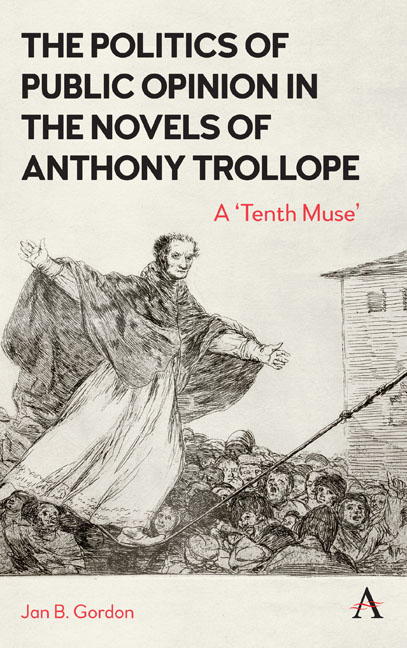Book contents
- Frontmatter
- Frontispiece
- Contents
- Preface: Overture to an Initial Public Offering
- Chapter One The “Prosthetic Body” of Public Opinion in Barsetshire
- Chapter Two Miming the Law
- Chapter Three “Playing” the Opinion Market
- Chapter Four The “Management” of Public Opinion in Trollope’s Bureaucracies
- Chapter Five The Sugar
- Index
Chapter Five - The Sugar
Published online by Cambridge University Press: 17 October 2023
- Frontmatter
- Frontispiece
- Contents
- Preface: Overture to an Initial Public Offering
- Chapter One The “Prosthetic Body” of Public Opinion in Barsetshire
- Chapter Two Miming the Law
- Chapter Three “Playing” the Opinion Market
- Chapter Four The “Management” of Public Opinion in Trollope’s Bureaucracies
- Chapter Five The Sugar
- Index
Summary
He was coming almost as full of politics, almost as devoted to sugar, as Mr. Palliser himself.
(CYFH II 413, ital. added)The ease with which both men and women develop an appetite for politics—as did Trollope himself—transforms how we think of public opinion and its component suppliers. A porously defined public comes to sit at previously exclusive or at least potentially monopolized metaphoric tables (with indifferent guardians), be it catering to ambition, enhanced social intercourse or reciprocal affection. This taste initially appears as “neo-Liberal,” perhaps akin to Trollope's self-identification insofar as it is potentially more socially inclusive. The attraction of favorable public opinion is a relatively universal taste across all classes and political parties.
Adam Kotsko has argued that neoliberalism is a form of political theology, albeit often exemplifying predatory inclusion. In both the theological and political novels of Trollope there is an emphasis on freedom and open markets, though not necessarily as an expression of choice or human creativity and dignity. Such open access by the public is rather an apparatus for reducing responsibility in favor of shared blameworthiness. Systemic failures are so dissolved as to be granular and individually unidentifiable, as the duke's eldest son, Lord Silverbridge, does under the duress of a public sympathetic with the foibles of the less advantaged, like Major Tifto in The Duke's Children. The dream of an inclusive discursive “commons” might be a preamble to Lawyer Chaffanbrass's judges in Phineas Redux, habitually handing down compromised verdicts by splitting the middle and dissolving differences, the better to avoid offending sensibilities.
This waiver of sovereignty (as firm judgment) yields to a general sugarcoating—a strategic neutralization of blame—which universally attracts while disguising what lies beneath. One might think of it as an adulteration of the sovereignty of private judgment by pressures of an imaginary collective voice. The negotiation of the loss of these sovereignties which had previously defined ideological, social and even narrative identity recalls Adorno's “constellation” with its pressures to “think about nonthinking.” Surely, this is one definition of public opinion, rhetorically touched upon by Trollope: “it should be a matter bound by our opinion rather than your own” (DC 171, ital. added) or perhaps more succinctly as a part of a negative dialectic “a thing not to be thought of which must be thought of” (DC 172).
- Type
- Chapter
- Information
- The Politics of Public Opinion in the Novels of Anthony TrollopeA 'Tenth Muse', pp. 177 - 218Publisher: Anthem PressPrint publication year: 2023

